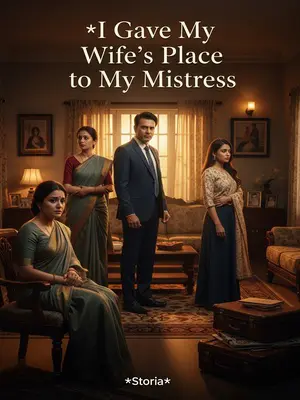Chapter 4: The Hundred-Day Ceremony
Rajeev had a child late in life, and now his career is at its peak. Plenty want to curry favour with him.
Our phone didn't stop ringing—everyone wanted an invite. Some sent fruit baskets in advance, hinting at gifts to come.
The hundred-day ceremony for the baby was supposed to be grand, but I suggested keeping it small, inviting only essential people for a private gathering.
I told Rajeev, "No need for band-baaja. Let's keep it simple, family and close friends only." He looked relieved.
Rajeev didn't object; he's long tired of endless social banquets. In fact, he's the true genius—most annoyed at having to explain his ideas to ordinary people, but now that he's in management, he has to deal with all sorts of social obligations.
Sometimes, I feel for him. His real joy is in solitude, but his position won't allow it.
So, he fully supported my suggestion.
He even thanked me for “understanding him,” a rare gesture these days.
I booked the ceremony at Annapurna private kitchen. The owner gave Rajeev face and reserved the entire second floor for us. Even so, the guest list kept growing, and it was still packed. Distinguished guests, family harmony.
The air was thick with perfume and politeness, waiters in starched uniforms darting between tables, children running underfoot.
In our family, the hundred-day mark is more sacred than a birthday—elders say it protects the child from buri nazar. Missing it is like inviting bad luck.
I knew, at times like this, it was hardest for Meera. She knows that as long as she's not the official wife, she can't spend any formal holiday with Rajeev. As long as she's not official, Rajeev can be called home by a family phone call at any time. As long as she's not official, she must endure others' cold looks and disdain.
This is the curse of the other woman—always watching through glass, never part of the circle.
She's very patient, has endured for years, pretending to be generous and unbothered, accumulating Rajeev's guilt.
I've seen the pain in her eyes, masked by a smile. In her own way, she's fighting too.
In fact, I'd found out she froze her eggs and convinced Rajeev to get checked at a fertility centre. Rajeev is almost persuaded—no matter how nicely she puts it, just wanting a child with her surname when she's old. But once that child is born, they'll inevitably take some of Rajeev's love and family resources. Rajeev has even consulted a lawyer about divorce plans.
I shudder to think how close I am to losing everything.
So, I can't wait any longer.
There is a point when patience is a luxury you can no longer afford.
On the day of the hundred-day ceremony, I had Sameer invite Meera to dinner. I knew she'd go. People are strange—knowing it will hurt, but can't help but look. Three years ago, at my mother-in-law's birthday, she hid at the back door to watch. This time, she would come too.
We are all drawn to the very things that wound us.
What I didn't expect was that she wore the same red saree as me.
A slap in the face—intentional or not, the message was clear: "I can match you in every way."
Upstairs, I was toasting and laughing in glory. Downstairs, in the public dining area, I wondered what she felt as she ate.
I pictured her poking at her food, half-listening to Sameer, the clatter of plates echoing her loneliness.
The last ceremony was for all guests to share the 'hundred-day cake.' I had the kitchen make plenty and even gave some to the diners downstairs, to spread the joy.
I told the chef, "Make sure everyone gets a slice. A child's milestone is for the whole community, na?"
Through the listening device on Sameer's end, I heard Meera say coldly, "I can't stand this Indian custom—private family affairs have to be announced to the whole world."
I heard the edge in her voice, sharp as a knife. Even the best actresses can't hide true hurt.
I could feel Meera's bitterness flooding downstairs. The timing was right.
I stood in the corridor, gathering courage. My heart was pounding, but my face was serene.
So I carried the baby and gracefully walked downstairs, found a quiet corner, opened my blouse, and began breastfeeding.
I draped my silk dupatta over my shoulder and sat down, cradling the baby as he latched on. A mother's right, a child's right—yet even this is policed.
For the key part, I used a silk dupatta to cover up, but everyone could tell I was nursing.
It was a statement, a silent war cry. The air grew tense as people noticed.
Maybe we've lived in so-called civilised society for too long. On the red carpet, a low neckline is sexy and fashionable, but a mother breastfeeding is often called indecent.
We watch Hollywood actresses praise motherhood, yet in our own homes, we are told to hide it. What hypocrisy.
A young waitress came over and said bluntly, "Madam, sab log are watching. Please, have some sharam. This is a family place."
Her tone was sharp, rehearsed. I saw her glance nervously at the manager.
"But my child is hungry. I have to feed him."
I looked her in the eye, voice calm but firm.
"You can feed your child in the restroom. This is a restaurant; doing this here isn't proper."
The suggestion stung. Would she eat in a toilet?
"Why don't you eat in the restroom? What's wrong with this being a restaurant? Can't a child eat here?"
My anger rose, the words tumbling out before I could stop them.
"Madam, sab log are watching. Please, have some sharam. This is a family place."
Every eye in the room was on me now. The room was thick with judgment.
I became furious: "How does me breastfeeding bother you? Weren't you born of your mother? Didn't you drink milk as a child? How is this uncomfortable? Who's uncomfortable? Show me!"
My voice shook the room. Even the aunty in the next table looked up from her WhatsApp messages.
My voice was loud, immediately drawing everyone's attention.
Suddenly, the background noise faded. Everyone was watching, waiting to see what would happen next.
Well-mannered men usually avoided looking at me and instead stared at the waitress. The women looked at me with complex expressions—sympathy, helplessness.
A few aunties exchanged glances, whispering behind their hands. Some nodded, some frowned.
The waitress raised her voice and retorted, "We only asked you to leave because a customer complained. Please have some self-respect and leave."
She was shaking now, her voice cracking. I almost felt sorry for her.
"Who? Who is so uncultured as to complain about a breastfeeding mother?"
I scanned the room, daring anyone to meet my gaze.
The waitress turned pale and was momentarily speechless.
She looked like she wanted to disappear.
At this moment, Meera stood up: "I complained. So what? Who's uncultured? In broad daylight, in public, exposing your sexual organs—you’re the uncultured village woman!"
Her voice was cold, cutting. The shock in the room was palpable.
"Someone like you deserves…"
She didn't finish, because Rajeev came downstairs.
His footsteps echoed, his face thunderous. I knew this was the turning point.
I guess Rajeev had never seen this side of Meera and was stunned on the spot. But after years of self-discipline, he quickly recovered, took off his jacket, and draped it over me and the baby.
His touch was gentle, his anger simmering beneath the surface.
Seeing his gloomy face, I whispered, "Upstairs is too smoky, and the baby was hungry. I had no choice."
I kept my eyes lowered, voice trembling. It was half-true.
I don't know what moved him at that moment, but he gently leaned in and said, "It's my fault. I didn't take good care of you."
His words surprised me. The Rajeev I knew would have scolded me for creating a scene.
Then he turned to the owner of Annapurna and said, "Sorry, Mr. Nair. My wife needs to breastfeed. Could you prepare a screen for her?"
His authority was unquestionable. Everyone waited for Mr. Nair's response.
Mr. Nair slapped his forehead, saying, "Arrey baba, my hospitality was lacking. Madam and young master, you've been wronged. This meal is on me—please give me a chance to make up for it."
He bowed, hands folded. The staff scurried to set things right.
By now, the previously aggressive waitress had vanished.
She melted away, knowing the tide had turned.
As I handed the waitress her money in the corridor, my hands trembled. Was this what I had become? A woman who scripts her own humiliation for the sake of survival?
I knew she'd lose her job for this, so I gave her 10,000 rupees in advance to act this scene with me. I also put a small amount of a psychoactive drug in the hundred-day cake I had her give to Meera—not much, just enough to temporarily unbalance her and amplify negative emotions.
I had planned everything, even the smallest details. Still, my heart pounded with guilt.
Rajeev protected me, which further agitated Meera. Under the drug's influence, she kicked down the screen.
There was a crash, the sound ringing out louder than any cry.
My heart raced. For a moment, I felt exposed and vulnerable.
My dupatta slipped as I stood, and for a second, I wanted to run. But I remembered Dadi's words—never show your back in a fight.
“Stop pretending! At your age, you’re still acting like some bechari sati savitri. Breastfeeding in public—aren’t you ashamed? Look at yourself—are any of the men in this hall even looking at you?”
Her voice was shrill, the bitterness spilling out for everyone to see.
This was the first time in my life I'd heard such ugly words, and I never expected them from the always gentle Meera.
Even the waiters stopped in their tracks. The air was thick with shock.
Even more unbelievable, before I could cry, she started crying first, pointing at Rajeev and scolding, “Look at you, treating this trash like treasure. You dress her in gold and silver, but she’s just a useless parasite—does she deserve it?”
Her mascara ran, her hands shaking. I almost pitied her, but my anger was stronger.
I couldn't see Rajeev's face, but he was clearly furious. His back, shielding me, was trembling. Guests from upstairs came down to watch the scene.
I heard my mother-in-law's voice from the stairs, gasping. The family's honor was on full display.
I really wanted Rajeev to slap Meera, but after all, she's a woman he's loved for years, so he couldn't do it. He just said to the owner, “Mr. Nair, have someone take this crazy woman out. Sorry for the trouble.”
He was calm, but the humiliation in his voice was unmistakable.
But Meera was already half-crazed, her eyes red as she lunged at Rajeev. Two security guards struggled to drag her out.
Her screams echoed through the hall. Some guests covered their children's ears.
“Rajeev, how could you? Why protect her? What is she but a woman who's given you a few kids? I can have kids too. Rajeev, you heartless man, I waited for you for years, and you call me crazy? Treat me like this? Rajeev, don't think I can't live without you—there are plenty of men after me…”
Her words hung in the air like a curse. The whispers grew louder.
This… the drug was too strong. I remember I didn't use that much. Not that I'm so kind, but I was afraid if I used too much, Meera would notice something was off.
My hands shook as I held the baby, guilt gnawing at my stomach.
Glancing at Sameer swirling his whiskey in the corner—damn, with alcohol, the drug's effect would be stronger. Then I saw Sameer quietly pour his drink into a flowerpot—did he give Meera something too?
My mind raced. If anything happened to Meera, it would all come back to me.
Better not let anything fatal happen. I quickly signalled Sameer to go take care of Meera.
He nodded once, lips pressed tight, and slipped out quietly.
Meanwhile, Rajeev's face was utterly disgraced. Worse, my mother-in-law fainted from anger, and my sister-in-law frantically pinched her nose and called for an ambulance.
The ambulance siren drowned out the gossip for a moment, but not for long.
The onlookers dispersed, but the secretly filmed videos would keep them entertained for a long time.
By the next day, our family WhatsApp group was full of speculation and "forwarded as received" messages.







